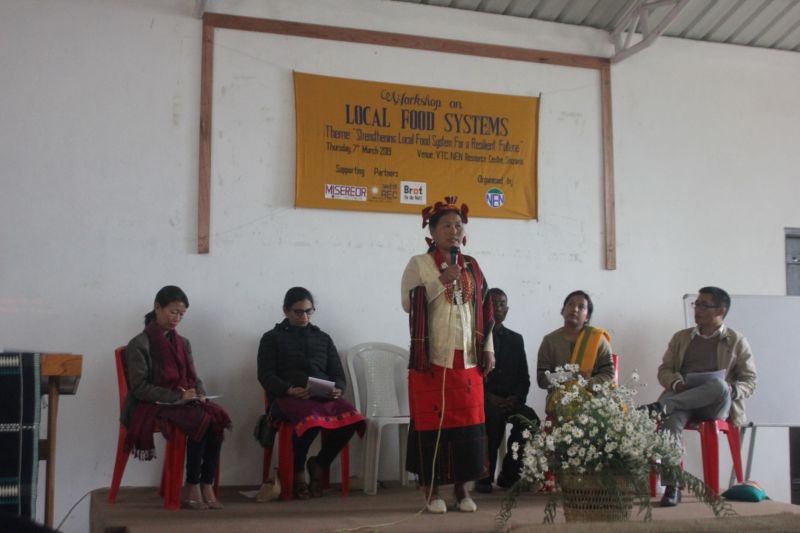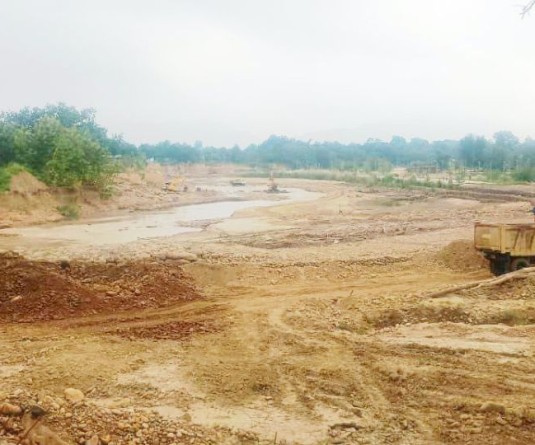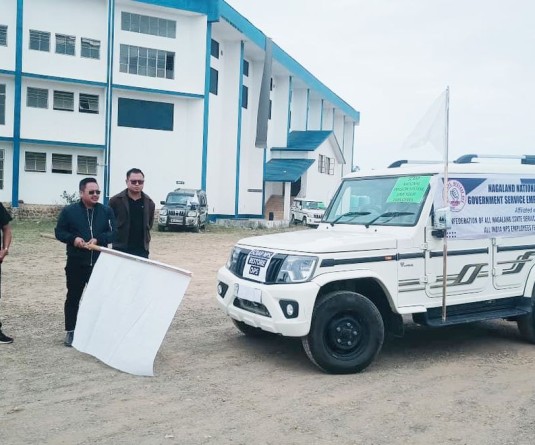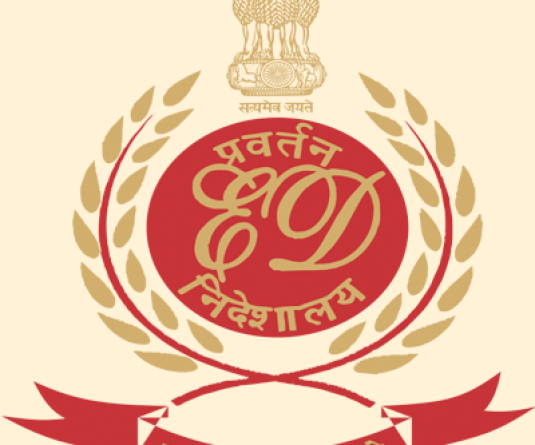Way forward for strengthening local food systems

Workshop on Local Food Systems with the aim to strengthen these systems to achieve a resilient future underway at the 10th edition of the NEN’s Biodiversity Festival in Chizami on March 7. (Morung Photo)
Indigenous farmers discuss issues at 10th edition of NEN’s Biodiversity Festival
Morung Express News
Chizami (Phek) | March 7
Indigenous peoples from several hills of the region—East Khasi and Jaintia Hills of Meghalaya, Chittagong Hill Tracts of Bangladesh or the hills of Phek, Noklak and Pughoboto in Nagaland—face similar issues vis-à-vis their food systems.
Forests, rivers, jhum or terrace fields that have been sources of food and nutrition for indigenous communities have been facing degradation. With changing land use and cropping patterns, like monoculture and cash crop plantations, or land grabs by military or development projects, traditional crops and agricultural systems are rapidly eroding. The use of chemicals on indigenous land is an omnipresent reality and governments almost never have policies that support traditional food crops and systems.
These became important points of discussion at the Workshop on Local Food Systems at the first day, March 7, of the 10th edition of the Biodiversity Festival underway at the North East Network (NEN) Resource Centre in Chizami. The theme was ‘Strengthening Local Food Systems for a Resilient Future.’
In a sub-workshop session on ‘Production and consumption of indigenous foods: status and experiences from the field,’ six speakers highlighted the issues. KomeklaRynjah, a farmer from East Khasi Hills, DakapayaBareh, field coordinator for SURE, Jaintia Hills, Meghalaya, MongsaprueMarma, a farmer from Chittagong Hill Tracts, Bangladesh, NeikhropeuTsido, farmer from Phek district, Thangem, a farmer and pastor from Noklak and BohotoZhimi, a farmer from Pughoboto—all extrapolated on indigenous agricultural systems, the problems they faced and how some of them are resolving those issues.
Conserving indigenous biodiversity (like seeds, wild edibles, livestock) as an essential for food and nutrition security emerged as a way forward. Further, awareness needs to be raised on the importance of this biodiversity and dietary biodiversity. Policy support from the government also needs to be advocated for in order to continue production of traditional foods and crops and sustainable farming practices with appropriate technological support. For this, it is important for farmers to collectivize and encourage collective farming.
Marketing: challenges & opportunities
Changing dietary habits with decrease in consumption of traditional crops and wild edibles means that there is growing dependency on market food. This not just alters work culture but also social culture itself.
To reverse this, a sub-workshop titled ‘Challenges & Opportunities in Marketing Traditional & Indigenous Foods’ ensued on Day 1 (March 7) of the Biodiversity Festival. Speakers included Withnald A Sangma, a farmer from the Garo Hills associated with NESFAS in Meghalaya, Zhoto Khamo from the Department of Women Resource Development of the Government of Nagaland, Atoli Sema, a street vendor in Dimapur associated with the Self Employed Women Association and Jayasri, Deputy Director at the Deccan Development Society (DDS) in Telangana.
Some of the major issues they identified with marketing indigenous foods were inaccessibility to markets, erratic pricing of such foods and crops, lack of knowledge among consumers, lack of vending spaces for women selling indigenous produce, inadequate government support, poor infrastructure, a highly competitive organic foods market, difficulties with quality control, taxation, extortion, lack of entrepreneurial skills or capital and so on.
The DDS has set up various successful models alongside Dalit women farmers in Telangana, like raising producer and consumer awareness on health and nutrition, indigenous foods, linking farmers and consumers, collectivisation and collective marketing with ‘sangams’ that have managed to hold autonomy over seeds, markets and foods. In Meghalaya, similarly, the North East Slow Food and Agrobiodiversity Society (NESFAS) has set up farmers’ markets, even sharing traditional recipes through cooking demonstrations. These collectives have also advocated for policy support for small producers, vendors for better access for indigenous farmers to markets, infrastructure, technology and skills.
In another section, Dr.BhogtoramMawroh of NESFAS shared the findings on a research study underway on the relationship between agrobiodiversity and dietary diversity.


.jpg)



